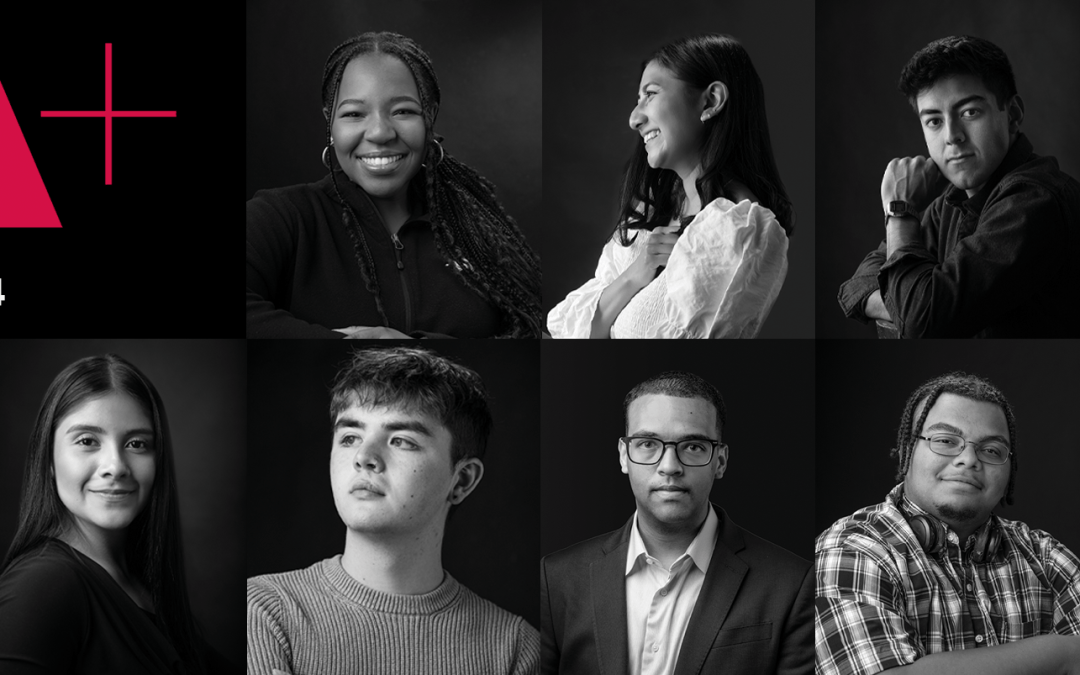By Shelby Gill / Photos by Russell Cothren
Candy bars, closing arguments, computer hardware and chicken coops. Sociology classes, sketch pads and Sunday afternoons. The path through the Honors College and beyond has looked very different for these 10 students and alumni. As we celebrate the 10th anniversary of the Path Program, we reflect on the accomplishments and impact of our scholars who have paved a transformative journey for generations to come.
The Path Program provides both scholarships and mentorship to students from underrepresented populations. Established in 2014, the goal of the Path Program is to recruit and mentor talented high school students and help them achieve academic success at the University of Arkansas and join the Honors College.



Alpha, Beta, Gamma… Each cohort of the Path Program is named after a letter of the Greek alphabet. The emphasis on cohorts builds lasting bonds among the scholars and provides a campus family.

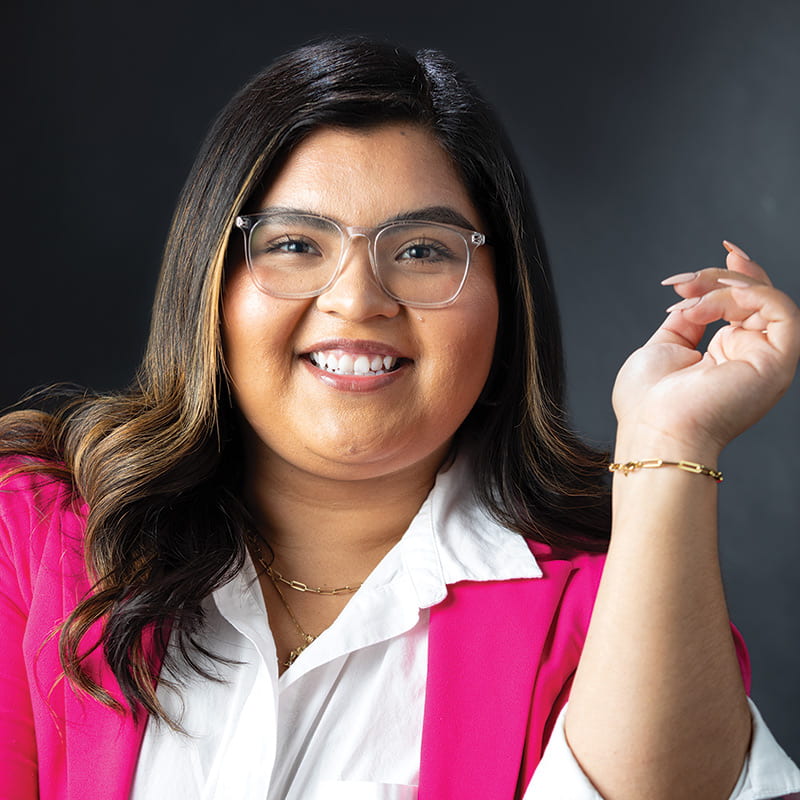
Iliana Borjes
When you check out at your local Walmart, chances are you’ve grabbed a candy bar from the display near the register. Those confection options were chosen through careful analysis and strategy by Iliana Borjes (B.S.Ch.E.’18).
The chemical engineering alumna works as a category management strategist for the Hershey Company. Her team focuses on the “Unplanned Purchases” section of confection shopping — the final treat when you finish shopping. She uses shopping data and competitive insights to make recommendations to Walmart on the displays and options.
“You’ve probably noticed that some checkout areas look very different,” Borjes explains. “We partner with stores to understand the best way for shoppers to be able to purchase candy at the front and ideate on what the future looks like both in a setting of how you shop and what you choose.”
In addition to analyzing the candy data, Borjes has personally learned about the different confection options. Growing up in El Salvador, the flavors and brands were not widely available. Now she has her favorites with Reese’s Take 5 at the top of her list. To Borjes, though, all the products are good options. “It’s candy, so it’s never boring,” she added.
Borjes’ path to confection started with the Path Program. She was part of the first cohort of students and initially applied because it was tied to the Honors College.

Iliana Borjes
“Being a first-generation college student, I didn’t have parents who could give me advice on how to maneuver my way through college,” Borjes said. “The Path Program opened a lot of doors for me: the Honors College, professors who became my mentors and students who were going through the same things.”
Borjes majored in engineering because she wanted to work directly on consumer products, but even more than that, she wanted to understand what they were made of. Her concentration in chemical engineering took her to companies like L’Oreal and Frito-Lay before she landed at Hershey. She credits her experience at the Honors College with preparing her for job fairs and interviews.
“I was in the Honors College all the time asking for advice or prepping my resume,” Borjes said. “Over time, I really gained the confidence to ace my interviews.”
Now, Borjes finds herself on campus in a different capacity. She’s on the other side of the table at the career fairs recruiting students for Hershey.
“I try to see life as being full circle,” Borjes reflects. “Because of all the opportunities I gained, I ask myself: how do I share those experiences and give back?”


Eduardo Puente
Eduardo Puente (B.S.I.B., cum laude, ’19) learned about business and technology from his father, who owned a company selling computer software and hardware in León, Mexico. Now, Puente is paving his own way in the business world. He worked for Nielsen straight out of college, and now he’s a manager of business insights and analytics at Walmart.
“My dad always had a business mindset,” Puente said. “That carried down to my brother and me. Analytics is the perfect combination of technology and business — having a bridge between those two was really important to me.”
Puente moved to the United States in seventh grade and remembers dreaming of attending college even at a young age. During high school, he heard about the Path Program.
“It was really interesting to see people of diverse backgrounds coming together to succeed,” Puente said.
Much like the efficiency of his business reports, Puente distills the impact of the Path Program into three main categories: Community: he felt safe to ask questions, made best friends and was motivated by the other members in his cohort. Accountability: mentors helped him set attainable goals and reach them. Financial stability: he was able to attend school and study abroad without debt.

Eduardo Puente
“I was the first person in my family to go to college in the United States,” Puente shared. “The Path Program held my hand through all of it. I met students who are striving to do their best and be their best selves — I think that’s what the Path Program is all about.”
In his current role, Puente oversees retail media and advertising for the Walmart Connect team. The data he distills support the sales team in helping suppliers maximize their campaigns.
Inspired to be his best self, Puente thinks about his job in analytics altruistically. It isn’t just numbers and bottom lines for him. There are people at the end of every equation.
“My job is inspiring,” Puente explained. “If I do my job well, we can keep costs low for families around the world. That’s our main goal.”
Currently, Puente also has a personal goal for himself. He’s in the process of getting a green card and, one day, his citizenship in the United States.
“The Path Program was a springboard for my life,” Puente said.

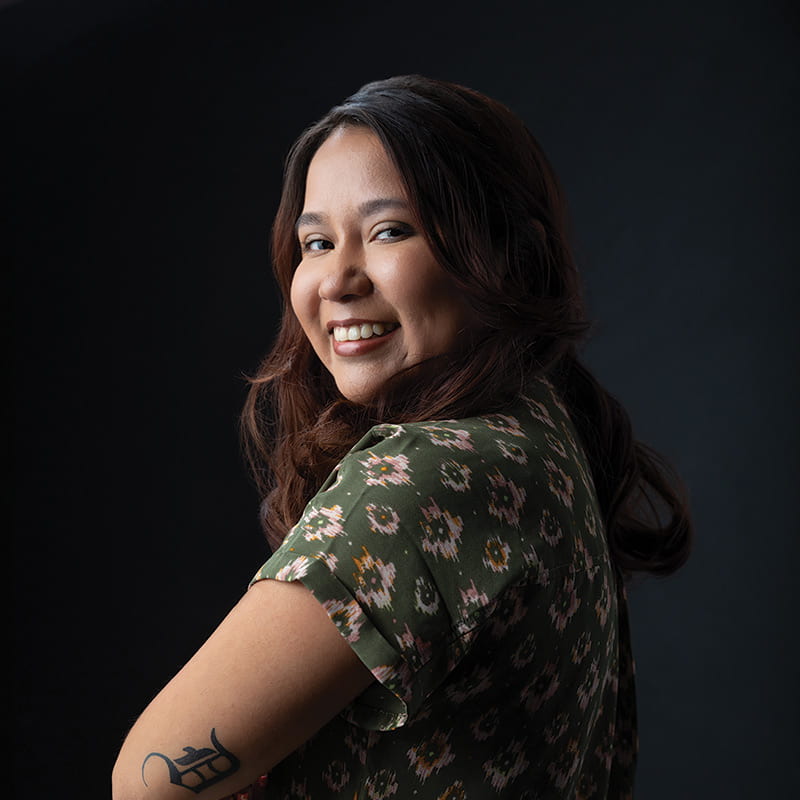
Rebeca Zapata
Inspired by a sociology class, Rebeca Zapata (B.A., psychology, cum laude, ’20) found a new purpose in her psychology degree.
“I really liked my psychology classes, but I wasn’t sure what I could do with my career,” Zapata said. “In sociology, I began to learn about prejudice, discrimination and bias. I was curious about how I could look at those things from a psychological perspective.”
Today, Zapata is finishing up the third year of her Ph.D. program in clinical psychology with a concentration in diversity science at the University of Texas Rio Grande Valley. Through the Path Program, Zapata was able to begin her research into diversity science at professor Ana Bridges’ Dream Lab as an undergraduate.
“I was interested in the Path Program because of the mentorship,” Zapata said. “It was a path to gain admission to the Honors College. I wanted to do research, and I knew the Honors College had those opportunities. Path gave me a foot in the door and support to get to that point.”
Zapata always had tremendous support from her family to attend college, but as a first-generation student, she knew she needed additional advice and mentorship to reach her goals.

Rebeca Zapata
“I was able to lean on my Path family,” Zapata said. “My whole cohort had really high goals – we just didn’t know how to reach them. It was awesome to be surrounded by community and then see each other actually achieve those goals.”
When evaluating graduate programs, Zapata ended up choosing a brand-new clinical psychology program in the Rio Grande Valley because of the location on the border of Texas and Mexico.
“The end goal is to serve the Mexican community through research,” she underlines. Whether she goes into counseling or continues in research, Zapata wants the public to know the impact of prejudice on mental health.
“Something is happening here, and we need to do something about it,” Zapata said. “Research provides a gateway toward legislation, creating new programs and funding. I hope to contribute that way to my community.”


Lizeth Martinez
When Lizeth Martinez (B.S., exercise science and kinesiology, magna cum laude, ’21) reflects on her time as an undergrad, she remembers the Sundays. Once a month on Sunday, her Path Program cohort would meet and update each other on life and school.
“How’s life?” Martinez remembers. “What have you accomplished? What are your dreams? Those are my favorite memories of college.”
Martinez is close to achieving her dream of becoming a Doctor of Physical Therapy. Inspired by her mother who works at a pediatric clinic in Springdale, Martinez pursued a career in helping people with their mobility and independence. This summer she’s moving to Little Rock to work in acute care.
As an undergraduate, she was looking for opportunities to get connected to the community on campus. The Path Program provided that community and also gave her inspiration to continue her education past undergrad.
“My parents are both from Mexico,” Martinez shared. “They barely finished grade school, and they started working immediately to provide for our family. I didn’t know what resources were available to me on campus. I didn’t know what a scholarship or graduate school application looked like. With Path, I realized I could keep going after college — I could keep going with this dream.”

Lizeth Martinez
Growing up in Northwest Arkansas, Martinez saw there was a large Spanish-speaking community, but not many therapists who were bilingual.
“I thought pursuing a career in healthcare would be impactful,” said Martinez, who is fluent in Spanish. “I want to help better serve the Hispanic population.”
One day, she hopes she can become a traveling physical therapist to “navigate language barriers” throughout the country.
Through the Path Program, Martinez has grown comfortable with taking chances.
“Don’t be afraid to fail,” Martinez advises. “Failing is inevitable. It’s the only way you grow as a person.”

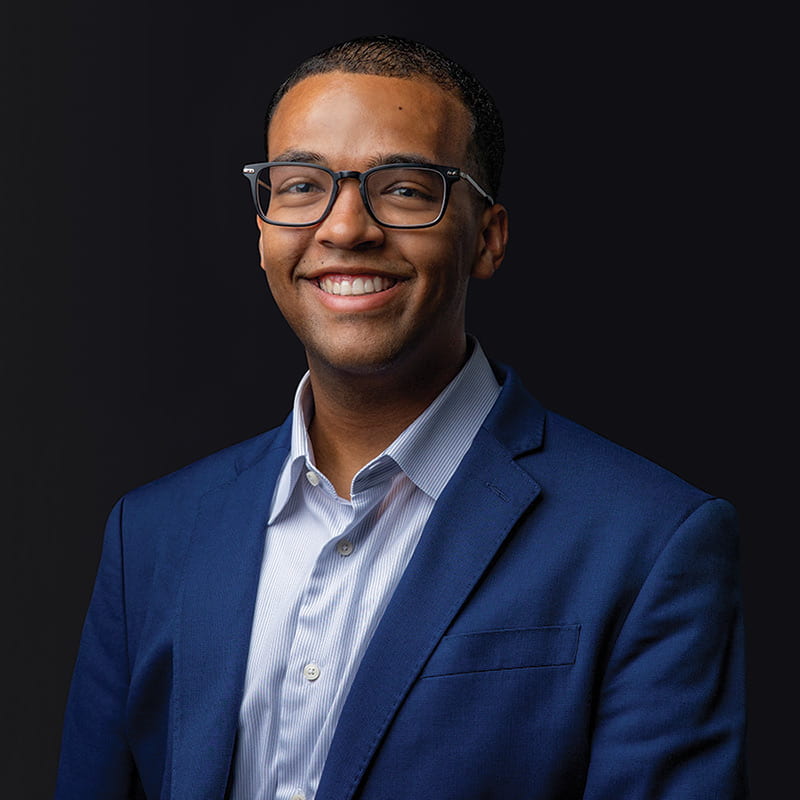
Elijah Conley
Elijah Conley’s dream law school wasn’t initially on his list of applications. Conley (B.A., political science and journalism, magna cum laude, ’21) wasn’t sure he could get in, and he was afraid to “take the chance.”
Through the encouragement of mentors at the Honors College, Conley graduated a year early, and he did apply. He was accepted to that dream school and nine others with his choice of options and scholarships.
Conley is beginning his third year at Georgetown Law in Washington, D.C. He was selected to be the senior diversity and inclusion editor for the Georgetown Law Journal. He’s already assisted on an amicus brief in a civil rights case, and he’s heading into his fourth internship.
Conley has always been passionate about media, government and politics. He grew up in a small town in Arkansas, where many of his classmates did not pursue a degree following high school graduation. Conley had a clear trajectory for his life, though — he wanted to be a lawyer. He was the first in his family to attend college and majored in journalism and political science.
“I saw education as a way to create the life I wanted for myself,” Conley shared. “And through that, I’ve always wanted to be a lawyer because it is a way to help people.”

Elijah Conley
Photo by Spencer Portraits
Conley loves living and learning in Washington, D.C. He feels like he is at the epicenter of his interests, and he reflects on the Path Program as paving the road to this dream.
“The support and community were a sense of comfort,” Conley said. “So much of what I was able to do in undergrad — my national internship with the Congressional Black Caucus Foundation, serving as a teaching assistant for the Inspired Honors course or becoming a resident assistant in Hotz Honors Hall — those opportunities stemmed from the relationships I built in Path.”
When Conley envisions his future now, he doesn’t have “tunnel vision.” He sees endless opportunities for himself, and he’s using his internships to explore all facets of law. He’s excited for his future but holds on to an important lesson he learned through the Path Program.
“When you get to where you’ve always wanted to be,” he began, “open the door for the person behind you.”

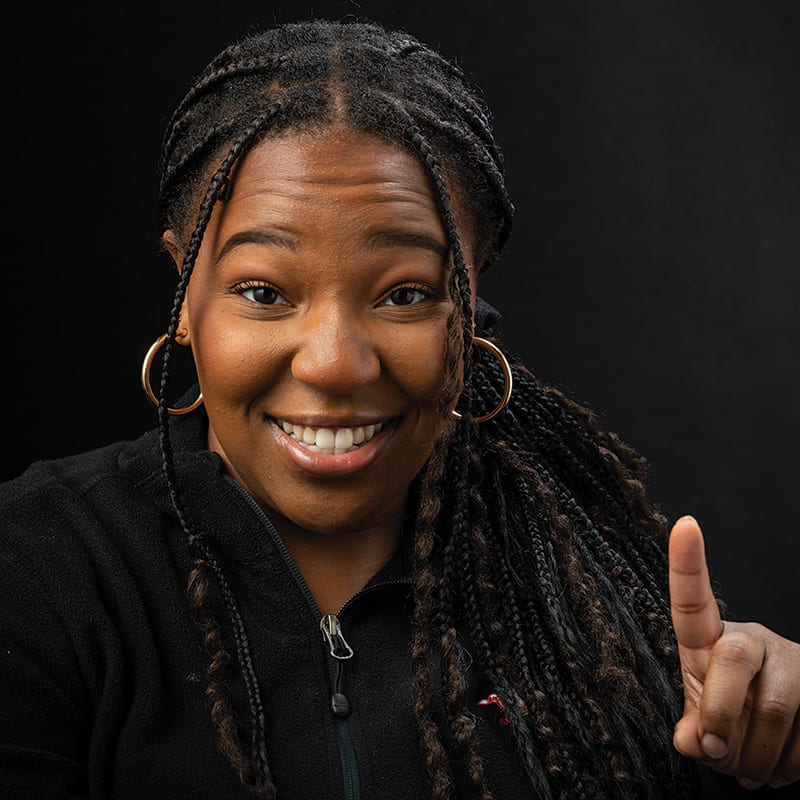
Breanna Kilgore
Breanna Kilgore (B.S.Bm.E., cum laude, ’23) grew up watching friends and family travel more than an hour to Louisiana or Little Rock, Arkansas, for specialized medicine. In extreme cases, residents had to be flown by helicopter to the UAMS Medical Center or Arkansas Children’s Hospital to be treated.
At first, Kilgore didn’t understand why El Dorado, Arkansas, did not have access to certain medicine, so she started reading about healthcare structures, rural medicine and medical inequities. Her path to healthcare was solidified during a scholarship webinar when she heard a presenter say, “Whatever you do in life, make sure you love it. And whatever makes you really angry or really sad, that’s what you’re passionate about.”
“I get really angry when people don’t have access to doctors, nurses or medical devices because of a price tag or infrastructure,” Kilgore said. “It shouldn’t be a privilege to be healthy. We should work as a community to make sure everyone can be the best they can be.”
Combining her love of technology with her passion for healthcare, Kilgore majored in biomedical engineering with the dream of creating medical devices and being at the forefront of scalable and accessible innovation.
“Engineering gives me the opportunity to be on the technical side, to investigate engineering policy or even pursue STEM education as a Black woman in engineering,” Kilgore shared. “There’s only one other Black student in my biomedical engineering class.” While on campus, Kilgore served as the vice president for the National Society of Black Engineers chapter to encourage new generations of Black students to enter STEM fields.
This fall, Kilgore will start an engineering fellowship at Rice University’s RICE360 Institute for Global Health Technologies. She will help create medical devices for mothers and children in sub-Saharan Africa.

Breanna Kilgore
“It’s reverse engineering,” Kilgore explained. “Instead of making a big machine for millions of dollars, we are going to downscale and see how we can make technology affordable for communities who may not have running water or access to electricity.”
Kilgore is no stranger to elite research opportunities. While at the U of A, she participated in the NanoBio Research Experience for Undergraduates at Johns Hopkins University. She spent the summer characterizing the secretion of endothelial-cell-derived extracellular vesicles under different levels of shear stress — an important step in vein regeneration and cancer development. She also studied abroad in Switzerland to learn about global health and developmental policy from leaders at the United Nations and World Health Organization. Kilgore sees her fellowship at Rice as just the beginning of her career and looks to her experience in the Path Program as a compass.
“Path pushed me out of my comfort zone,” Kilgore reflected. “The team encouraged me, built my confidence and gave me a support network so I could finish my undergrad with honors and succeed after graduation.”
Kilgore sees the Path Program as an integral bridge to higher education for students from underrepresented communities.
“If people back home had the support system I’ve had, the possibilities would be endless,” Kilgore said. “I’ve worked very hard for these four years. Growing up, I watched a lot of people do jobs they hate. It was work that was grueling and hard for them. I am so grateful to have this opportunity to explore something I love. It’s a great relief to know I’m doing something I’m interested in, and that will have an impact on the world.”


Madison Price
Branch, Arkansas, is home to six churches, one gas station, County Line High School, fewer than 400 people and Madison Price. Price graduated from high school alongside 33 other students, and she was the only student in her class to attend the University of Arkansas. Branch is proudly a small town, and that’s what Price loves about it. It’s a “close-knit community” and “everyone gives you advice and tips about life.”
When thinking about her college experience, Price knew she wanted a community that felt like home, and she found that in the Path Program.
“Once I interviewed with Path, I was determined to get into the program,” Price said. “I could tell how much the staff cared about the students, and I could see how close the students were to each other.”
Price is studying agricultural business — an industry that is close to her heart. Price grew up on a small cattle farm and has always loved the business side of agriculture. Throughout high school, she was active in Future Farmers of America, student council and even showed pigs at the county fair.
“I appreciate my experiences on the farm,” Price said. “That’s why I’m such an advocate for agriculture.”
“Path connected all the dots for me in my education.”

Madison Price
Through her connections in the Path Program, Price got first-hand business experience interning for Arkansas Gov. Asa Hutchinson after her freshman year. Through encouragement from mentors, Price also studied abroad on a service-learning project in Belize where she built chicken coops and installed above-ground gardens. Driven by a passion to learn more about international agriculture, she’s packed up again this summer and headed to the U.K. to learn about environmental and agricultural communications. Price’s education and the experience gained on her family farm have led her to make connections throughout the state and around the world.
“It’s hard to believe the Path Program has led me to so much,” Price said. “Path connected all the dots for me in my education.”
Now, Price is in the process of writing her honors thesis. She is studying food insecurity with first-generation college students with hopes of identifying solutions and developing on-campus resources.
Because of her experiences on campus, Price is interested in public service as a career, but also wants to continue to travel the world and see agriculture practices internationally.
“The Path Program has made me a better person personally and professionally,” Price said. “I have an open mind, open ears, and I’m ready to take advice and run with it.”

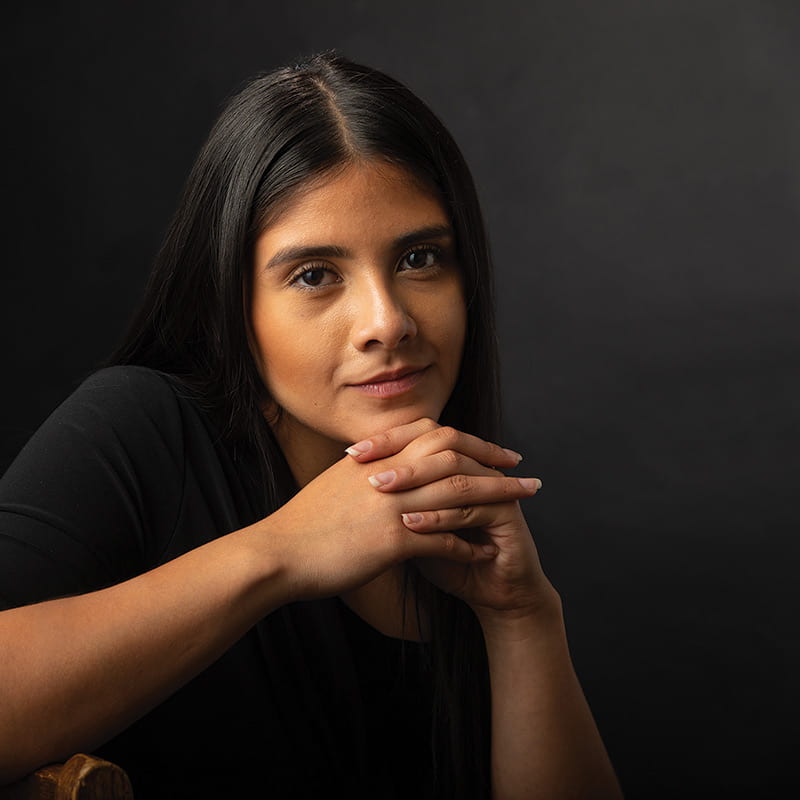
Keiry Flores
Keiry Flores’ favorite family recipe is panes rellenos: chicken stewed in a thick, savory broth and served on a sandwich roll with fresh vegetables. Flores grew up celebrating her culture through food, but she also realized many of her favorite dishes were stereotyped as unhealthy because of their roots.
“Honestly, a lot of the food in the Hispanic culture is healthy — in terms of the macros, which would be your protein, carbs and fats,” Flores said. “It was surprising to me because a lot of people in the culture don’t think their food is healthy. When they start a diet, they begin by taking away all their cultural food.”
Flores, who is studying food nutrition, wants to dispel this myth through a career in holistic nutrition.
“I’ve just noticed that there’s a lot of misinformation in terms of dieting and diet culture,” she said. “I thought I would get a lot of knowledge out of having the food nutrition background in order to inform and coach the Hispanic community on food choices.”
Flores’ family is from El Salvador, and she is a first-generation college student. Throughout her life, Flores was supported and encouraged to go to college, but at the forefront of her mind was funding.
“I initially applied for the Path Program because of the scholarship,” Flores said. “But it’s so much more than money. I’ve grown my confidence immensely in terms of advocating for myself. I’m more social, and I’ve learned how to network.”
Flores believes the Path Program has changed her mindset about the future from “half empty” to “half full.” She’s taking the lessons she learned in Path and applying it to her future career.

Keiry Flores
“I want to pursue holistic nutrition because of my personal experience,” Flores shared. “I believe in paying attention to your body and learning to become more in tune with who you are and using the natural world to your benefit. I want to help improve other people’s lives in the same way.”
Flores is also finding ways to impact the community on campus. Tameka Bailey, an assistant professor of biological sciences, invited Flores to work with a STEAM (science, technology, engineering, arts and math) summer program for rising 6th grade students from Dumas, Arkansas. The program is aimed at getting students engaged, interested and thinking about STEAM disciplines to nurture a lifelong pursuit. The project is funded by the National Institutes of Health.
“Research shows that children decide what they want to be when they grow up in 5th to 7th grade,” Flores said. “We want to introduce them to the STEAM fields during these ages and plant the seeds in their growing minds.”
Flores has found great success on campus, but she still finds “patience” to be the most important lesson she’s learned in college so far.
“You have to go down to be able to go back up,” Keiry said. “Be patient and allow yourself to let go of negative situations.”

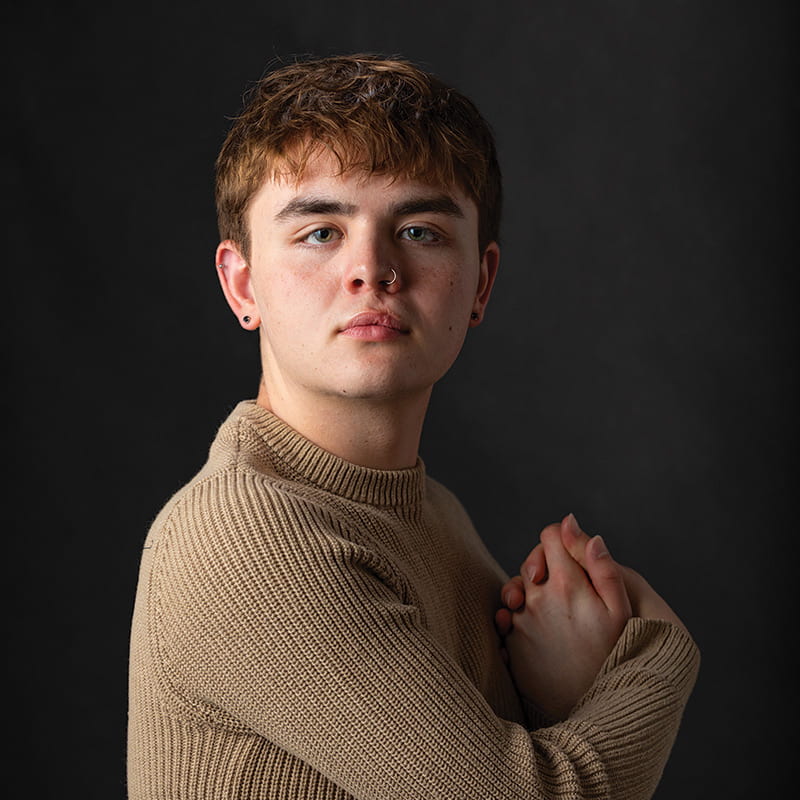
Brylan Cole
Brylan Cole is well-acquainted with 30-minute commutes. As the Sharon Killian Endowed Intern at the Crystal Bridges Museum of American Art, he made the drive to Bentonville weekly, but it was worth it to be immersed in his passion — studio art.
Before he came to the University of Arkansas as a Path Scholar, he drove more than 30 minutes daily to high school. His hometown, Bergman, Arkansas, “did not have the opportunities” Cole needed to get to art school, and so he trekked to a larger school every day.
“[My family] grew up with very little income,” Cole said. “Art was a form of escapism.”
After taking art classes he quickly developed skills in painting and drawing, but it was sculpture that resonated with Cole.
“The artwork itself is parallel to my own personality. Sculpture and mixed media combine everything. That’s me. I love trying new things and am an amalgamation of my interests.”
Cole can open his art journal and find the word “Path” scrawled between notes about his experience at a summer art workshop in high school. It was the first time Cole heard about the program. As a first-generation high school graduate and college student, Cole knew he needed advice and accountability to reach his potential.
“I can’t ask my dad, mom, grandmother or anyone in my family about the things I’m experiencing [at university],” Cole said. “The Path Program had the mentorship I crave, and it gave me community on campus immediately. I can operate on my own, but it’s important to have people who understand how this institution works — they understand higher education.”

Brylan Cole
Incoming Path students attend a two-week bridge program where they move to campus early, take classes and make meaningful connections with one another. Cole remembers staying up until 2 a.m. talking to the other students every night.
“We started hanging out constantly. It was so reassuring for me to meet people from different parts of Arkansas and the country who had shared experiences,” Cole reflects.
Although Cole is only a freshman, he has big dreams for his future — pursuing his M.F.A. in sculpture or attending law school. He visits the Honors Futures Hub frequently to plan his next steps.
“I come from being low-income, marginalized and queer in the rural south,” Cole said. “I feel like art, community and politics are all inherently connected.”
Cole recently had the opportunity to be on the student panel of interviews for the incoming Path Program cohort.
“When growing up marginalized and without the resources needed to succeed, you often hear the word ‘no.’” Cole shared with prospective students. “Always ask for more, expect the most for yourself. I limited myself when I shouldn’t have, and now that I’m at the University of Arkansas, I’m working to change that mindset.”

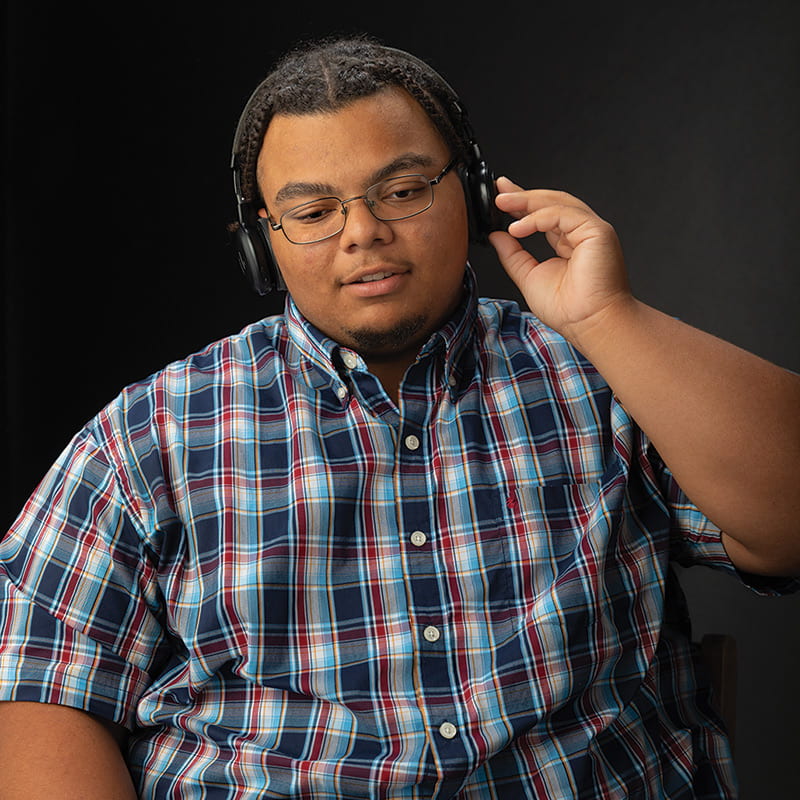
Keithan Smith
Keithan Smith is driven by three things: music, sports and his spirituality. He fell in love with the guitar when he heard “Mississippi Queen” by Mountain. Since then, he’s learned to play the guitar, bass, piano, percussion and even the saxophone. When he’s not jamming out to rock music, he’s on the football or baseball field. In his down time, you’ll find Smith at his local church volunteering and hanging out with friends. Smith has learned to cultivate and nurture his hobbies and relationships to help him find peace and belonging in uncomfortable situations.
“One unique thing about me — I have autism” Smith shared. “I think that’s probably one of the most interesting things about me.”
Smith was diagnosed when he was five years old. While there have been challenges, like “anxiety in social settings or nervousness to meet new people,” sports gave Smith an outlet to work through his fears.
“With football, I get to lay out all my emotions on the field,” Smith explained. With baseball, he finds he’s able to center and ground himself. “I’m very hyperactive, but I get very wired in and focused with baseball, especially when it’s my turn to bat.”
The impact of sports and a team environment led Smith to work toward a career in coaching.
“Unfortunately, I did not grow up to be 6-foot-4, so I’m not going to play in the NFL,” Smith laughed. “But coaching is a great career.”
From Mineral Springs, Arkansas, Smith grew up watching the Razorbacks play with his family. And when it came to coaching, he learned a lot about what he liked in a Razorback coach and what he didn’t. As college applications opened, Smith knew with certainty he wanted to attend the University of Arkansas.

Keithan Smith
“It was amazing,” Smith said, recalling his acceptance. “I was like a kid on Christmas. Every day, I would check my application status. When I got the acceptance, my dad ran around the whole block, celebrating. It was really special for us.”
In addition to his undergraduate acceptance, Smith found out he was a finalist for the Path Program. He was nervous that he would “freeze like a deer in headlights” during his in-person interview, but he was relieved when he was able to share his love for music and sports. His passion outshone his fear, and he was accepted into the program. Smith began his freshman year at the University of Arkansas in fall 2023.
“I’m most excited for the bond and camaraderie,” Smith shared about the Path Program. “I feel like having a support system will help me throughout the four years.”
Smith is still deciding on his major; he’s interested in exercise science and nutrition to prepare him for a career in coaching. He does know he will be bringing his guitar with him to campus.
“I feel like having a support system will help me throughout the four years.”

